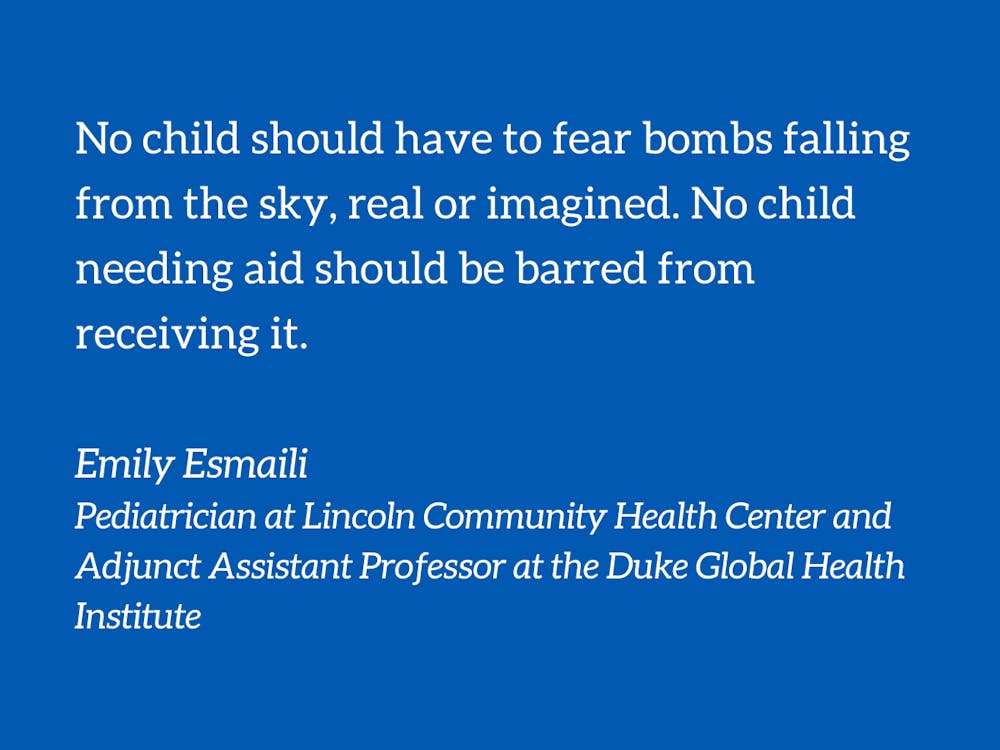“If all the raindrops were lemon drops, and… bomb drops?” My 6-year-old couldn’t quite remember all of the song she had learned in school, but this didn’t sound quite right to her. Nor did it sound right to me — this morbid version of “lemon drops and gumdrops” made me freeze in place. I suppose I cannot completely shield my children from the world’s news.
I try my best to keep our dinnertime discussions away from my opinions on conflict in the Middle East and immigration policy. But as an Iranian-American pediatrician working in a clinic that serves immigrant and refugee children, I suppose things slip once in a while. News of the horrific showering of bombs in the Middle East is hard to filter. Meanwhile, another disaster hit closer to home — the tropical storm that has washed away so much of western North Carolina, one of our family’s favorite mountain biking destinations.
You don’t have to be a pediatrician to know that it’s the children both in western North Carolina and in the Middle East that are more vulnerable and more deeply affected by disasters. Both groups of youngsters need our immediate help.
Thankfully, aid has been rushing into western North Carolina — within days, helicopters were dropping food, water and diapers. But in the Middle East, close to where my other family lives, what mostly drops from the sky are explosives. In Gaza, hundreds of thousands of families are cut off from all aid, and the region has been without adequate food and water for months. More children have died from conflict there in four months than have died globally in the last four years. And society and politicians alike have chosen to look the other way, silent.
I’ve worked with children in refugee camps in different parts of the world — Greece, Thailand, India, Rwanda — and with refugee and immigrant children resettled here in Durham. And as many humanitarian workers will say, certain things you just cannot unsee. I cannot unsee the shrapnel in eardrums, disfiguring burns and severe anxiety. Many children under my care have seen bombs fall like raindrops from the sky. Their homes were flooded, burned or forcibly taken from their families. They still cry when a plane flies overhead, or when fireworks go off at the ballpark.
No child should have to fear bombs falling from the sky, real or imagined. No child needing aid should be barred from receiving it. Imagine our devastated western North Carolinians, if emergency relief was not allowed in. And if we felt it best to hold a position of neutrality, and just not act or speak out for their suffering. Imagine how our children might feel, if we simply looked the other way when friends and families’ homes and lives had been ruined.
Conflict and natural disasters are human realities, but there are certain rules of fair play that must be upheld. These rules of humanitarian law are not being upheld in the Middle East and many other war-torn parts of the world. Children caught in these disasters are most heavily impacted, and yet global communities are choosing to remain silent.
As a pediatrician but mostly as a mother, I ask you to speak up. Speak to your government representatives. Vote. Speak to your children in an open and honest way about what they see on the news. Teach them fairness, and the possibility of peace. Teach them to sing, with the right lyrics: “If all the raindrops were lemon drops and gumdrops, oh what a rain that would be …”
Emily Esmaili is a pediatrician at Lincoln Community Health Center in Durham and an adjunct assistant professor at the Duke Global Health Institute.
Get The Chronicle straight to your inbox
Sign up for our weekly newsletter. Cancel at any time.

